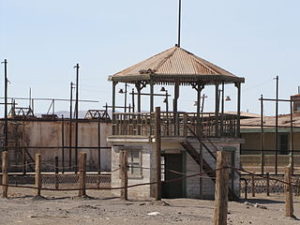Committee for Cultural Policy and Global Heritage Alliance Written Testimony submitted to Cultural Property Advisory Committee, Bureau of Educational and Cultural Affairs, U.S. Department of State, on the Proposed Memorandum of Understanding Between the United States of America and the Republic of Chile
To Chairman Sabloff and the Members of the Cultural Property Advisory Committee to the President:
The Committee for Cultural Policy (CCP)[1] is an educational and policy research organization that supports the preservation and public appreciation of art of ancient and indigenous cultures.
CCP supports policies that enable the lawful collection, exhibition, and global circulation of artworks and preserve artifacts and archaeological sites through funding for site protection. CCP deplores the destruction of archaeological sites and monuments and encourage policies enabling safe harbor in international museums for at-risk objects from countries in crisis. CCP defends uncensored academic research and urges funding for museum development around the world. CCP believes that communication through artistic exchange is beneficial for international understanding and that the protection and preservation of art is the responsibility and duty of all humankind.

Santa Laura, Chilean National Monument, 2010, photo Claudiorodriguez, Wikimedia Commons.
Global Heritage Alliance (GHA)[2] advocates for policies that will restore balance in U.S. government policy in order to foster appreciation of ancient and indigenous cultures and the preservation of archaeological and ethnographic artifacts for the education and enjoyment of the American public. GHA supports policies that facilitate lawful trade in cultural artifacts, and promotes responsible collecting and stewardship of archaeological and ethnological objects.
The Committee for Cultural Policy and Global Heritage Alliance jointly submit this testimony on the Proposed Memorandum of Understanding (MOU) for the imposition of import restrictions between the United States and the Republic of Chile.
Both the Committee for Cultural Policy and Global Heritage Alliance support the Congressionally mandated application of the 1983 Cultural Property Implementation Act (CPIA).[3] We do not support the imposition of overbroad import restrictions or import restrictions that ignore Congress’s carefully crafted and statutorily mandated criteria.
Response to the Request by Chile for a Memorandum of Understanding Under the CPIA
It is deeply ironic that the Cultural Property Advisory Committee requests public commentary on requests from foreign governments under the CPIA to be limited to the four determinations[4] set forth in the CPIA in 19 U.S.C. 2602(a)(1(A-D), without requiring foreign governments – Chile, for example – to make any showing whatsoever under these key provisions of the Act.
The Public Summary of the Government of Chile’s Request For U.S. Import Restrictions On Cultural Property (“Chilean Request”) provided by the Department of State fails to address the proposed scope of restrictions, the state of current looting and depredations, or the significance of the U.S. market. It is the equivalent of a high school writing assignment that is prolix, but gets an F for failing to answer the question.
Both the Chilean Request and the Federal Register Notice fail to state the scope of proposed import restrictions, by inference, including ALL “archaeological material representing Chile’s cultural patrimony.”

Chajnantor plain, Chile. The penitentes are are thin spikes of hardened snow or ice, with sharp edges pointing towards the Sun, reaching heights from a few centimeters up to several meters. Photo ESO, Wikimedia Commons.
The Chile Request begins with Pillage and Jeopardy to the Cultural Patrimony of Chile, a virtual Wikipedia list of every prehistoric and historic period applicable to the territory of Chile. It concludes with a blanket statement that “complete and almost complete archaeological objects from the North and Central regions are the most commonly trafficked items.” That is all the information provided in order to establish that each one of the many dozens of sites listed, covering the entirety of Chile’s archaeological history is under serious threat of pillage, an explicit requirement under 19 U.S.C. 2602(a)(1(A).
The Chilean Request continues with a description of fossils – which Congress did not include in the coverage of the Cultural Property Implementation Act. In fact, the Chilean Request’s extensive and indiscriminate list of “objects trafficked” includes fossils, paleontological materials and stone projectile points from 12,000 B.C.E. up to the end of the nineteenth century C.E.
Assuming that import restrictions are requested for all the items mentioned as “trafficked,” the Chilean Request fails to provide evidence that this vast range of materials is currently subject to looting, and thus does not meet the requirements set by Congress in the Cultural Property Implementation Act. Chile has entirely failed to satisfy the determinant required by 19 U.S.C. § 2602(a)(1)(A) to show that the cultural patrimony for which import restrictions are sought is in jeopardy from pillage.
Altogether, the Chilean Request is pathetically devoid of numbers, dates, or any evidence substantiating its claim that Chile currently has a looting problem. The Chilean Request mentions specific dates for looting or seizures only once, with respect to paleontological materials seized “between 2007 and 2017.”
This first section closes with the statement that “illicit trafficking operates… in many ways,” that “occasional looters or tourists ignore national legislation and illicitly excavate, collect, or purchase objects.” There is a third sentence mentioning, but not supplying “evidence that organized gangs contact Chilean or foreign collectors directly or through intermediaries to supply client demands.” The Chilean Request has thus failed to provide any information whatsoever on current looting or other current threats to heritage as required under the CPIA.
The Chilean Request Does Not Show A U.S. Market For Archaeological or Ethnological Materials

Humberstone, Chilean National Monument, photo Maralma7, Wikimedia Commons.
A search at Sotheby’s New York for pre-Columbian objects from Chile from 2010 to the present turned up zero results. Christie’s offers Pre-Columbian art as part of the biannual sales of African and Oceanic art in Paris in April and October. It does not hold Pre-Columbian sales in the U.S.
The Chilean Request fails to show that the United States is a significant market for recently looted Chilean antiquities. The Chilean Request does not provide any data on recent U.S. imports of any of these materials. It does not show that there is any significant market for recently looted Chilean antiquities anywhere. Nor does it demonstrate that U.S. import restrictions will have a significant effect in preventing current looting in Chile.
No International Exhibitions to the US
The long list of authorities in the Chilean Request does not mention a single entity or a single project involving the promotion of Chilean heritage abroad (except for Chilean officials’ “attendance at seminars and workshops”). There is no listing of traveling exhibitions or cultural exchange programs, presumably because there have not been any recent traveling exhibitions or cultural exchange programs sending Chilean culture to the U.S.
An active program of cultural exchange that brings Chilean heritage to the U.S. public is the absolute minimum acceptable to demonstrate, where looting is endemic, that “the application of import restrictions is consistent with the general interest of the international community in the interchange of cultural property among nations for scientific, cultural, and educational purposes.”
Chile has failed to meet even the generous terms under which CPAC has interpreted claims that a sufficient number and commitment to museum loans and traveling museum exhibitions sent to the U.S. will compensate for the curtailing of entry of Chilean art and artifacts to the U.S. Thus it has failed to meet the requirement for the imposition of import restrictions under 19 U.S.C. §2602(a)(1)(D).
Chilean Entities That Protect and Promote Cultural Heritage

Easter Island, World Heritage Monument, 2013, Photo Alanbriton, Wikimedia Commons.
The longest section of the Chilean Request is taken up with a list of all the bureaucratic and police authorities with an interest in culture in Chile. A long list of bureaucratic entities related to culture in the Chilean Request does not demonstrate that Chile has taken steps to protect its heritage as required under 19 U.S.C. §2602(a)(1)(B).
The Chilean Request fails to show that Chile has taken steps to halt domestic sales within Chile to tourists, saying only that tourists “ignore national legislation” and illicitly excavate, collect, or purchase objects.” This raises the question, are such objects openly for sale? Tourists are notoriously bound to touristic venues and are known for buying souvenirs when and where they are offered for sale. Do Chile’s police and other authorities also “ignore national legislation” and fail to stop such sales?
The only entity listed in the Chilean Request that appears to actually do anything to protect cultural heritage is the National Monuments Council, which oversees the protection of more than 1600 National Monuments. All other entities are involved in developing information systems, evaluating plans, providing expert reports etc. Surprisingly, the Chilean Request does not mention a single plan or expert report specific to halting looters, protecting monuments, or reporting on actual documented crimes. Only such expert reports would inform CPAC and the U.S. public about how Chile is protecting monuments, or show what resources the Chilean government has dedicated to protecting heritage.
Chile has thus failed to satisfy the determinant required by 19 U.S.C. § 2602(a)(1)(B) that the State Party has taken measures consistent with the Convention to protect its cultural patrimony, and it has also failed to meet Congress’s current expectations.
Congress Requires Proof of Source Country Protection – and Funding for Protection

Cerro Concepción, Valparaíso, Chile. October 17, 2007, photo PR, Los Antipodas. Wikimedia Commons.
In 2017, Congress took steps to ensure that the Cultural Property Advisory Committee (CPAC) actually documented the effort (or lack of it) that art-source countries made on their own behalf to inventory and protect sites and museums. The law that CPAC operates under requires that a country requesting import restrictions meet the following requirement:
19 U.S.C. § 2602(a)(1)(B) that the State Party has taken measures consistent with the Convention to protect its cultural patrimony.
The Cultural Property Advisory Committee has often been accused of ignoring this requirement; during 2002-2003, CPAC approved a Memorandum of Understanding in which the only step taken by the source country was to put a couple of posters up at the airport. Congress finally took steps to make sure that it was clear this was insufficient – yet putting up informative posters at the airport – is a part of Chile’s cultural heritage program.
That kind of action is not nearly enough. The House Appropriations Subcommittee included language in the federal year 2018 State, Foreign Operations and Related Programs Appropriation Bill urging CPAC to “consider the annual national expenditures on securing and inventorying cultural sites and museums in its annual reviews of the effectiveness of MOUs, as well as during the reviews required by the CPIA for extension of an MOU.”
The Appropriations Subcommittee also indicated that they will hold CPAC responsible: “The Cultural Properties Implementation Act (CPIA) requires countries participating in MOUs restricting cultural property take significant self-help measures… The Committee also requests the Secretary of State review the feasibility of collecting and reporting on the cost of measures taken by partner countries in support of their cultural property MOU with the United States and be prepared to report on such review during the hearing process on the fiscal year 2019 budget request.”
This language has teeth, as it tells the Department of State to prepare to have answers during this year’s hearing process, and in all future years. It sets Congress on record as stating that parties to MOUs are required to take significant self-help measures and these need to be considered when judging the effectiveness and continuation of MOUs.
Conclusion
In sum, the Chilean Request fails to show that Chile meets the criteria set by Congress for an agreement under the CPIA. Every one of the statutory criteria must be met in order for the U.S. to implement import restrictions under the Cultural Property Implementation Act.
When the CPIA was passed, Congress never indicated that it was in the interests of the United States to block imports of all art and archaeological materials from source countries. Congress contemplated a continuing trade in ancient art except in objects at immediate risk of looting. Nor did Congress state that halting the trade in art was a positive goal. On the contrary, Congress viewed the CPIA as balancing US academic, museum, public and commercial interests by both assisting art source countries to preserve archaeological resources and ensuring the U.S.’s continuing access to international art and antiques through a relatively free flow of art from around the world to the U.S.[5]
At a minimum, a publicly available statement showing that statutory requirements are met is a necessary first step. By accepting a request from the Government of the Republic of Chile that fails to establish that Chile has a current looting problem and that its government is working diligently to halt it, the Cultural Heritage Bureau has lowered the threshold for a request under the CPIA to zero.
The public is left to guess at Chile’s intentions and the scope of the request. By failing to require Chile to show that it meets the criteria under the law, it turns the tables and reverses the burden of proof – placing it on the public to prove that Chile’s Request is inadequate. This Kafkaesque reversal of the plain language of the Act makes a mockery of Congress’ intent to protect American interests in access to art and the preservation of a lawful global circulation of art.
The Committee for Cultural Policy and Global Heritage Alliance concur that the request by the Government of Chile (Chilean Request) fails to meet the four mandatory determinations under the Act, and the request for import restrictions should be denied.
[1] The Committee for Cultural Policy, POB 4881, Santa Fe, NM 87502. www.culturalpropertynews.org, info@culturalpropertynews.org.
[2] The Global Heritage Alliance. 1015 18lh Street. N.W. Suite 204, Washington, D.C. 20036. http://global-heritage.org/
[3] The Convention on Cultural Property Implementation Act, 19 U.S.C. §§ 2601, et seq.
[4] According to the website of the Bureau of Educational and Cultural Affairs, “public comments should focus on the four determinations.” https://eca.state.gov/highlight/cultural-property-advisory-committee-meeting-april-1-3. Last visited 2019/03/25.
[5] 19 U.S.C. § 2602(a)(1)(A-D) and 19 U.S.C. § 2602(a)(4)
[Federal Register: March 11, 2019 (Volume 84, Number 47 (Page 8777)]


